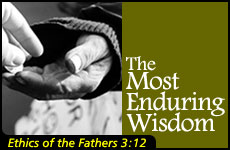 Iran’s Attack on Israel
Iran’s Attack on Israel


4 min read
Climbing the spiritual mountain.
[Rabbi Chanina] used to say: "Anyone whose good deeds exceed his wisdom, his wisdom will endure. And anyone whose wisdom exceeds his good deeds, his wisdom will not endure." Ethics of the Fathers, 3:12
At first blush, our mishna appears to teach a principle so obvious and self-evident that it scarcely deserves mention. What good is knowledge and wisdom if they do not lead to good deeds? How can a person be truly wise if he does not apply his wisdom to daily life?
Nothing our sages tell us can be so simple. Indeed, elsewhere the Talmud tells us, after listing the most praiseworthy of all good deeds, that "the study of Torah is equal to them all." If Torah study is equal to all good deeds combined, how can we understand that Torah without good deeds will not endure?
The answer lies in the giving of the Torah itself. The Talmud records that God chose Mount Sinai on which to give the Torah because it was the smallest mountain, thereby teaching us the importance of humility. But if the Almighty wished to teach humility through the giving of the Torah, why did He not give the Torah in a valley? Would that have not communicated the message even better?
The nature of humility is frequently misunderstood. Imagine a Heisman Trophy winner who claims he is not really such a good football player, a Pulitzer Prize winner who insists he is really a hack writer, or an Olympic Gold Medalist who argues that he is really a mediocre athlete. Such a person is not humble. He is a fool. To deny talent and accomplishment is to indulge false modesty and, even worse, it is insulting to those who tried their best and failed to make the grade.
Genuine humility is recognizing that talent and ability are God-given, and that such blessings carry with them the obligation to strive toward the fulfillment of one's personal potential.
This is the message of Sinai: that each of us has to "climb the mountain" to merit the Almighty's greatest gift -- the Torah, which enables us to climb and keep on climbing to limitless spiritual heights.
Good deeds are wisdom applied.
Yes, there is no greater occupation than the study of Torah, since the Torah is the purest revelation of God's will and the source of all wisdom. But wisdom that remains disconnected from the practice of good deeds is not true wisdom. If the scholar fails to climb the mountain of practical application, if he does not concretize his wisdom through acts of kindness and righteousness, through the morality and spiritual self-discipline that are the essence of Torah teaching, then his scholarship will come to nothing.
The truly wise never rest upon their laurels. They strive every day to improve upon the past, acquiring new knowledge, building upon yesterday's wisdom, and pushing themselves to new levels of righteousness.
The Talmud describes how, upon arriving in the next world, every person will be shown his yeitzer hara, his inclination to do evil. The righteous will see a towering mountain and ask in astonishment, "How did I ever conquer that?" The wicked will be shown a tiny smudge upon the ground and ask in astonishment, "How was I unable to conquer that?"
Throughout our lives, Divine Providence places obstacles in our paths. By exerting ourselves to overcome each obstacle, we make ourselves stronger and, when we do, our lower self has to become stronger next time to preserve our free will. However, if we never exert ourselves to overcome temptation, our evil inclination never needs to become stronger at all. And so, step by step, the righteous become ever stronger so that they can defeat an ever-strengthening evil inclination, while the wicked never challenge themselves and thus go nowhere.
Good deeds are wisdom applied. Without wisdom, we have no moral compass to determine whether our deeds are good are bad. And even the greatest wisdom, without good deeds, is ultimately no wisdom at all.
